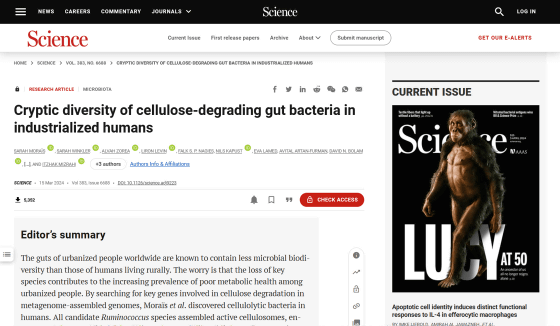Research results show that people living in urban areas are losing 'gut bacteria that break down dietary fiber'

Cryptic diversity of cellulose-degrading gut bacteria in industrialized humans | Science
https://www.science.org/doi/10.1126/science.adj9223

Boosting gut health: Fiber-degrading microbes in modern diets - The Jerusalem Post
https://www.jpost.com/health-and-wellness/nutrition/article-792662
Scientists find people living in urban areas and cities are becoming less able to digest plants | Euronews
https://www.euronews.com/health/2024/03/21/gut-bacteria-to-digest-fibre-less-present-in-industrialised-societies-study-suggests
Humans Living in Cities Are Slowly Losing Their Ability to Digest Plants: ScienceAlert
https://www.sciencealert.com/humans-living-in-cities-are-slowly-losing-their-ability-to-digest-plants
Dietary fiber is a general term for food components that are difficult to digest by human digestive enzymes, and most of it is cellulose, which makes up the cell walls of plants. Although it is not directly absorbed by the human body, a study in 2003 discovered human intestinal bacteria that break down cellulose, and at the time of writing, it was found that some intestinal bacteria break down dietary fiber and the products are absorbed by the human body, and that dietary fiber helps maintain a good balance of intestinal bacteria.
In a new study, researchers from Israel's Ben-Gurion University of the Negev and the Weizmann Institute of Science analyzed a variety of gut bacteria samples to investigate the cellulose-breaking properties of human gut bacteria.
The samples included gut bacteria from modern humans of various cultures, feces left by humans from about 1,000 years ago, non-human primates , and various ruminant animals .
The analysis revealed three previously unknown species of gut bacteria
'Breaking down cellulose is not an easy task, and very few bacteria can do it,' said study co-author Professor Edward Bayer of the Weizmann Institute of Science. 'Cellulose is insoluble, which makes it difficult to digest. Dietary fibre in the gut is like a tree trunk floating in a swimming pool: it may get wet, but it doesn't dissolve.'
The team also found that the abundance of these cellulose-decomposing gut bacteria varied across different human populations: They found that these bacteria were abundant in people who lived more than 1,000 years ago, modern hunter-gatherers, and rural people, but 'significantly rare' in modern urban populations.
It has been pointed out that modern people's diets are lacking in dietary fiber , and the decline in gut bacteria that break down dietary fiber may be due to the reduction in dietary fiber ingested. 'Our findings suggest a decline in these gut bacteria in the human gut, possibly due to the shift to a Westernized lifestyle,' the research team said.

Related Posts:
in Science, Posted by log1h_ik







